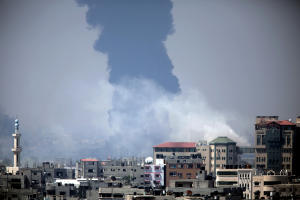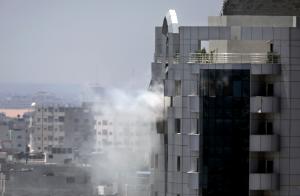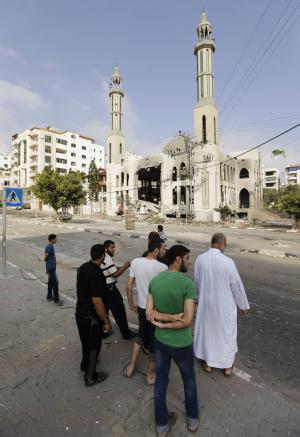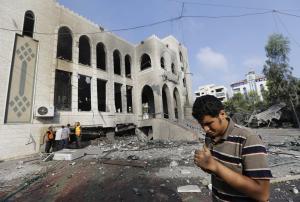GAZA CITY, Gaza Strip (AP) — Israel escalated its military campaign against Hamas on Tuesday, striking symbols of the group's control in Gaza and firing tank shells that shut down the strip's only power plant in the heaviest bombardment in the fighting so far.
Flares turned the sky over Gaza City orange overnight and by daybreak, as the conflict entered its fourth week, heavy clouds of dust hovered over the territory. A thick column of black smoke rose from a burning fuel tank at the power plant.
The pounding came after Israeli Prime Minister Benjamin Netanyahu on Monday warned of a "prolonged" campaign against Hamas. It was not clear if this meant Israel has decided to go beyond the initial objectives of decimating Hamas' ability to fire rockets and demolishing the group's military tunnels under the Gaza-Israel border.
Already, the intensity and the scope of the current Gaza operation is on par with an invasion five years ago, which ended with a unilateral Israeli withdrawal after hitting Hamas hard.
In Tuesday's strikes, Israeli warplanes carried out dozens of attacks, leveling the home of the top Hamas leader in Gaza, Ismail Haniyeh, and damaging the offices of the movement's Al-Aqsa satellite TV station, a central mosque in Gaza City and government offices.
Haniyeh, whose house was turned into a mountain of rubble by a pre-dawn airstrike, said in a statement Tuesday that "destroying stones will not break our determination."
View gallery

Smoke rises from an Israeli strike at a building in Gaza City, foreground, as black smoke billows fr …
No one was hurt in Haniyeh's home. Since the start of the war, Israel has targeted several homes of Hamas leaders but none was killed presumably as they appear to have gone into hiding.
Gaza's power plant was forced to shut down after two tank shells hit one of three fuel tanks, said Jamal Dardasawi, a spokesman for Gaza's electricity distribution company. The shelling sparked a large fire and a huge column of smoke was seen rising from the site. Dardasawi said 15 workers were trapped inside by the fire and that the damage would take months to repair. There was no immediate word on casualties.
Even before the shutdown, Gaza residents only had electricity for about three hours a day because fighting had damaged power lines.
Lt. Col. Peter Lerner, an Israeli military spokesman, did not comment on the explosion at the plant, but told The Associated Press that Israel's latest strikes signal "a gradual increase in the pressure" on Hamas.
"Israel is "determined to strike this organization and relieve us of this threat," Lerner said.
View gallery

Smoke rises from a building was hit with an Israeli strike in Gaza City, Tuesday, July 29, 2014. Isr …
International calls for an unconditional cease-fire have been mounting in recent days, as the extent of the destruction in Gaza became more apparent.
More than 1,110 Palestinians have been killed and more than 6,500 wounded since July 8, according to Ashraf al-Kidra, a Gaza health official. The U.N. has estimated that 75 percent of those killed are civilians.
At least 26 Palestinians were killed early Tuesday in the airstrikes and tank shelling on four homes, according to the Red Crescent.
The house of the mayor of the Bureij in central Gaza was hit in an airstrike, and five bodies were pulled from the rubble, the Red Crescent said. Those killed included the mayor, 50-year-old Anas Abu Shamaleh, his 70-year-old father and three relatives.
In the southern town of Rafah, seven members of one family were killed in an airstrike and seven members of a second family were killed when tank shells hit their home, according to the Rafah office of the Palestinian Center for Human Rights, which keeps a casualty count.
View gallery

Palestinians inspect the damage at the Ameen mosque in Gaza City, northern Gaza Strip, destroyed by …
In central Gaza, seven people, including five members of one family, where killed by tank shelling on a home, the Red Crescent said.
Israel has lost 53 soldiers, along with two civilians and a Thai worker.
Tens of thousands of Gazans have been displaced by fighting in the border areas, which have come under heavy tank fire. Late Monday, Israel urged residents of three large neighborhoods in northeastern Gaza to leave their homes and immediate head to Gaza City.
Despite appeals for a cease-fire, both sides have been holding out for bigger gains.
Hamas has said it will not stop fighting until it wins international guarantees that a crippling border blockade of Gaza will be lifted. Israel and Egypt had imposed the closure after Hamas seized Gaza in 2007, defeating forces loyal to their political rival, Palestinian President Mahmoud Abbas. Over the past year, Egypt has further tightened restrictions, shutting down hundreds of smuggling tunnels under the Egypt-Gaza border that had provide crucial tax income to Hamas. The closure of the tunnels drove Hamas into a severe financial crisis.
View gallery

Palestinians inspect the damage at the Ameen mosque in Gaza City, northern Gaza Strip, destroyed by …
Israel has said it is defending its citizens against attack from Gaza by hitting Hamas rocket launchers, weapons storage sites and military tunnels under the Gaza-Israel border.
Israel said its troops will not leave Gaza until they have demolished the tunnels which have been used by Hamas to sneak into Israel to try to carry out attacks. On Monday, Gaza militants infiltrated through one of the tunnels and killed five soldiers in a firefight. One of the assailants was also killed. Separately, four Israeli soldiers were killed by mortar shells from Gaza that hit southern Israel.
Israel media have said the army has destroyed close to 20 of 31 identified tunnels, but that 10 more tunnels are believed to be in areas of Gaza still outside Israeli control.
After the deaths of the soldiers, Netanyahu signaled that Israel is intensifying its air- and ground campaign. "We will continue to act aggressively and responsibly until the mission is completed to protect our citizens, soldiers and children."
Overnight, Israel carried out about 70 airstrikes, the military said.
Haniyeh's house, located in a narrow alley of the Shati refugee camp, was reduced to rubble. Residents placed a large framed portrait of Haniyeh atop the rubble, and draped Hamas flags and Palestinian national banners over the debris.
Neighbor Imhane Abu Ghaliyeh, 60, who lives 50 meters (yards) from Haniyeh's home, said area residents fled after apparent warning missiles were fired.
__
Enav reported from Jerusalem. Associated Press writer Ibrahim Barzak in Gaza City contributed to this report.